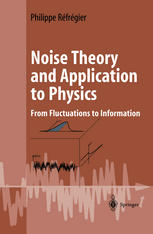

Most ebook files are in PDF format, so you can easily read them using various software such as Foxit Reader or directly on the Google Chrome browser.
Some ebook files are released by publishers in other formats such as .awz, .mobi, .epub, .fb2, etc. You may need to install specific software to read these formats on mobile/PC, such as Calibre.
Please read the tutorial at this link: https://ebookbell.com/faq
We offer FREE conversion to the popular formats you request; however, this may take some time. Therefore, right after payment, please email us, and we will try to provide the service as quickly as possible.
For some exceptional file formats or broken links (if any), please refrain from opening any disputes. Instead, email us first, and we will try to assist within a maximum of 6 hours.
EbookBell Team

5.0
110 reviewsIn many situations, physical quantities are perturbed or evolve in a not fully predictable way. We then speak about noise or fluctuations and we are generally faced to different questions such as: What are the correct physical models to describe them? What are the most practical mathematical tools to deal with them? How can relevant information be extracted in the presence of noise?
Noise theory and application to physics provides a precise description of the theoretical background and practical tools for noise and fluctuation analyses. It not only introduces basic mathematical descriptions and properties of noise and fluctuations but also discusses the physical origin of different noise models and presents some statistical methods which optimize measurements in the presence of such fluctuations.
Noise theory and application to physics investigates a number of ideas about noise and fluctuations in a single book in relation with probability and stochastic processes, information theory, statistical physics and statistical inference. The different notions are illustrated with many application examples from physics and engineering science and problems with solutions allow the reader to both check his understanding and to deepen some aspects.
Indeed, the main objective of Noise theory and application to physics is to be a practical guide for the reader for going from fluctuation to information. It will thus be of great interest to undergraduate or postgraduate students and researchers in physics and engineering sciences.